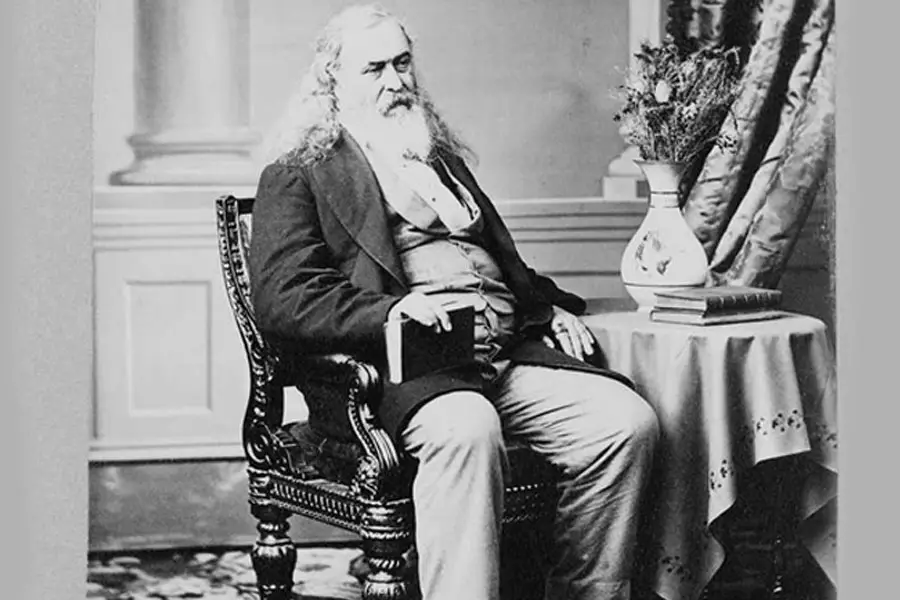Albert Pike was an incredibly accomplished and important figure in the history of the United States and especially Free Masonry. But what made him so important?
Albert Pike was important because he developed the Scottish Rite of Freemasonry. A prominent Mason, he was a General in the American Civil War, prolific writer, intellectual and poet, lawyer, and advocate for Native American rights.
Althought passionate about the rights of the indigenous people of the United States, his legacy is also marked by controversy in this matter, as at times his actions were different than his position on the matter.

Albert Pike was a Prominent Figure in American Freemasonry
Pike is credited with playing a major role in the development of the Scottish Rite of Freemasonry in the United States. The Scottish Rite is a system of degrees, or levels, of initiation within the larger framework of Freemasonry.
Pike was appointed as the Grand Commander of the Supreme Council, 33rd Degree, Southern Jurisdiction of the Scottish Rite in 1859. Under his leadership, the Scottish Rite experienced significant growth and expansion in the United States.
Pike revised and rewrote the ritual and ceremony of the Scottish Rite, creating a more structured and organized system of degrees. He also added a number of new degrees and expanded the philosophical and mystical content of the Scottish Rite, making it a more intellectually stimulating and spiritually oriented organization.
In addition to his work on the Scottish Rite, Pike also wrote extensively on Masonic philosophy and symbolism, and his writings helped to shape the intellectual and spiritual direction of Freemasonry in the United States.
Overall, Albert Pike’s contributions to the Scottish Rite of Freemasonry helped to establish it as a major force within American Freemasonry, and his influence on the development of the Rite continues to be felt to this day.
Pike was a Prolific Writer on Masonic Ritual, Symbols, and Philosophy.
Albert Pike was a prolific writer and wrote extensively on Masonic ritual, symbols, and philosophy. Some of his most important works include:
“Morals and Dogma of the Ancient and Accepted Scottish Rite of Freemasonry” – This is one of Pike’s most important works and is widely considered a Masonic classic. The book provides a comprehensive overview of the ritual, symbolism, and philosophy of the Scottish Rite, and it is still widely read and studied by Freemasons today.
“The Book of the Words” – This is a collection of the speeches and addresses that Pike gave during his time as Grand Commander of the Supreme Council, 33rd Degree, Southern Jurisdiction of the Scottish Rite. The book provides insight into Pike’s views on the history and philosophy of Freemasonry.
“Hymns to the Gods” and “Hymns to the Elements” – Pike was a talented poet and wrote several books of poetry, including “Hymns to the Gods” and “Hymns to the Elements.” These books reflect Pike’s spiritual and mystical interests, and they demonstrate his appreciation for the beauty and wonder of nature.
Overall, Pike’s writings on Masonic ritual, symbols, and philosophy have had a profound impact on the development of American Freemasonry, and they continue to be widely read and studied by Freemasons and scholars alike.
Pike was an Influential Confederate General during the American Civil War
Albert Pike was a Confederate general during the American Civil War. He served in the Confederate army as the chief judicial officer and was responsible for overseeing the administration of military justice.
Pike was known for his leadership and strategic skills, and he was highly respected by his fellow Confederate officers. He played a key role in several important battles, including the Battle of Pea Ridge in Arkansas, where he commanded a brigade of Indian troops.
Despite his success as a military leader, Pike was also known for his independent and sometimes controversial views. After the Civil War, Pike was arrested by the federal government and imprisoned for a short period of time. However, he was eventually released and went on to play an important role in the reconstruction of the South.
Overall, Albert Pike’s service as a Confederate general during the American Civil War was a significant chapter in his life and legacy, and it demonstrates his commitment to the cause of the Confederacy and his skills as a military leader.
Pike was a Lawyer by Profession and was Known for his Expertise in International Law
Albert Pike was a well-respected lawyer, and he was known for his expertise in international law. He was admitted to the bar in Arkansas in 1834 and established a successful legal practice in Little Rock.
Pike was known for his extensive knowledge of legal and constitutional matters. He was a skilled orator and was often called upon to argue complex legal cases in court.
In addition to his legal practice, Pike also served as a diplomat and represented the Confederate government in negotiations with Native American tribes during the Civil War. He was a passionate advocate for Native American rights and was known for his efforts to secure fair treatment for indigenous peoples.
Pike was a Deeply Spiritual Man and had a Strong Interest in the Occult, Mysticism, and the Study of Ancient Civilizations.
In his writings, he often discussed the contributions and legacy of ancient civilizations, such as the Egyptians and Greeks.
Pike believed that ancient civilizations held important lessons for modern society, and he was particularly interested in the role of religion and spirituality in shaping these cultures. He believed that ancient civilizations held valuable insights into the nature of the divine and the meaning of life, and he drew on these traditions in his own philosophical and spiritual writings.
In “Morals and Dogma of the Ancient and Accepted Scottish Rite of Freemasonry,” Pike wrote about the influence of ancient civilizations on modern society, and he argued that the wisdom of the ancients could help to guide contemporary society towards a more enlightened future.
Pike was a Philosopher and Intellectual who had a Deep Interest in History, Religion, and the Nature of Reality.
Albert Pike was a deeply spiritual and philosophical individual, and his views on history, religion, and the nature of reality are reflected in his many writings and speeches.
Pike believed that history was the story of human progress, and he saw the evolution of religion as an important aspect of this progression. He believed that the development of religion was a reflection of humanity’s growing understanding of the divine, and he saw the rise and fall of different religious traditions as a natural process of growth and evolution.

In terms of the nature of reality, Pike believed that there was a deeper spiritual reality beyond the material world, and he saw the material world as a manifestation of this deeper spiritual reality. He believed that this spiritual reality was the source of all life and consciousness, and that it could be experienced and understood through spiritual practices and disciplines.
Overall, Albert Pike’s views on history, religion, and the nature of reality reflect his profound spiritual and philosophical insights, and his belief in the importance of seeking a deeper understanding of the world and the mysteries of existence.
Pike was a Well-Known Poet and Published Several Books of Poetry
He wrote several books on poetry, including “Hymns to the Gods” and “Hymns to the Elements.” His poems covered a wide range of subjects, including love, nature, and spirituality. He was known for his lyrical and sometimes philosophical style, and his poems often reflected his deep spiritual beliefs and his love of the natural world.
Some of Albert Pike’s most well-known poems include “The Harp of a Thousand Strings,” “To a Mountain Daisy,” “The Voice of the Spirit,” and “The Stars of the South.” These poems showcase Pike’s mastery of language and his ability to convey powerful emotions and ideas through his writing.
Pike’s poems continue to be widely read and admired, and they remain an important part of his legacy as a writer and poet. They demonstrate his deep love of language, his passion for spirituality and nature, and his ability to convey complex ideas through the beauty of his words.
Pike was a Passionate Advocate for Native American Rights
Albert Pike had a complex relationship with Native Americans. He was passionate about the rights of indigenous peoples and believed that they were entitled to fair treatment and protection under the law. He was appointed by the Confederate government as a commissioner to negotiate treaties with various tribes during the American Civil War, and he was instrumental in securing their support for the Confederacy during the conflict.
However, Pike’s actions towards Native Americans were not always in line with his stated beliefs. At times, he was known to use military force to achieve his goals, and he was involved in negotiations that resulted in the displacement of Native American communities.

Despite these criticisms, Pike was widely respected by many Native American leaders, who appreciated his knowledge of their culture and history, and his willingness to listen to their concerns. He was known to be a skilled negotiator and was successful in securing the support of several tribes for the Confederacy during the Civil War.
Overall, Albert Pike’s relationship with Native Americans was complex and marked by both positive and negative aspects. While he was committed to protecting their rights and ensuring fair treatment, his actions were sometimes at odds with these beliefs, and he was involved in negotiations and decisions that had negative consequences for Native American communities.
Recommended Reading
If you want to continue exploring this subject more deeply, you can see which books I recommend by clicking here.

